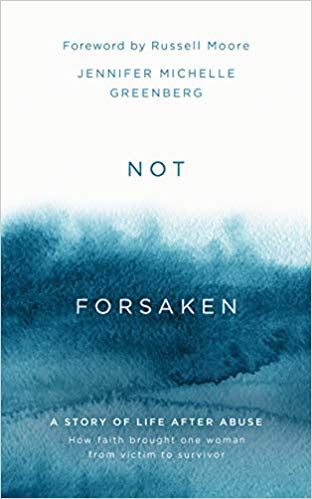How to Support Your Wife Who Was Abused

Every so often I receive an email from the husband of an abuse survivor. Almost always, he asks a variation on the same question; “How can I help my wife who was abused?”
For some, their wife was abused long ago during childhood. Her abuser may be dead or distant. For others, her abuser was a previous husband, boyfriend, or sibling. Her abuser may pose an ongoing threat.
Whatever the case, these husbands want to know what they can do to help their wife cope with trauma, heal, and recover.
If this is you, the first thing I want to do is encourage you. God has placed you in this marriage for a reason. It’s a big responsibility, yet God is faithful, and he will enable you by his grace to be a godly husband.
God certainly worked mightily through my husband to help me recover from over two decades of child abuse, domestic violence, sexual abuse, and psychological abuse. So, here are a seven ways to love her that I pray will inspire you, enable you, and strengthen your marriage and your ministry to your wife:
1. Listen to and Love Her
As the husband of a woman who was abused, you are on the frontlines. You are the boots-on-the-ground. Her go-to person. Her first defense. As such, you’ll likely be the first person she tells many things. Some of them will be upsetting. Some of them will break your heart.
Take comfort in the knowledge that it’s not your job to fix this. It’s not something that can be fixed, except miraculously, by God. So, your job is to listen and love her. If something she confides causes you to become angry, assure her that you love her and are angry at those who harmed her.
It probably goes without saying that finding fault in her, such as lamenting the fact that she went to that party, or drank too much, or whatever the situation may be, is unhelpful. Rather, as Romans 12:15 says, “… mourn with those who mourn.”
Hug her. Hold her. Reassure her of your love. Hear her weep, weep with her, and pray with her.
2. Counteract Lies with Truths that Build Her Up
As your wife confides in you, you’ll likely hear about cruel things her abuser said. Lies about her. Insults. Harsh critiques. Backhanded compliments. Listen carefully to those abusive words, because they are a tool you can turn around to build your wife up.
If her abuser mocked her weight, make a note to compliment her figure every now and then.
If they called her stupid, reassure her regularly how smart and clever you think she is.
She may struggle to believe you at first. It may be a while before she takes your words to heart. But this process will help slowly untangle the knots of psychological abuse, reversing the damage done to her self-image and perception. Eventually, with patience and time, you can replace her sorrow with joy and her insecurity with confidence.
3. Protect Her from Abuse
There may come a time when you need to cut an abuser out of her life. I remember during my early 20’s, my dad would call me on the phone and convince me to let him visit for the weekend. During one visit, late at night, he snuck out of our guestroom, logged onto the personal computer in my office, and emailed private files to our pastor and possibly others.
The files included an unsent letter I’d written to church leaders expressing how angry I was that they hadn’t seen through my dad or done anything to protect me. It seemed my dad was trying to turn our church leadership against me.
After that breach of privacy, our pastor recommended we not let my dad stay in our home again. In fact, he recommended I cut all communication. But I was still too afraid of my dad, and loved him too much, to tell him I needed him to stay out of my life.
So, my husband, Jason, did it for me. He told my dad that from that point on, he couldn’t call me, email me, visit me, or send me gifts. My dad was cut off. Except for a sister’s wedding, I haven’t seen or spoken to him in about 12 years.
Some people do not want to be forgiven. At least, not for the right reasons. Your wife will need a wise protector to defend her from people who mean her harm.
For example, I’ve learned that I’m vulnerable to personalities that subconsciously remind me of my dad. I’m used to certain brands of sin – apathy, misogyny, and sexual harassment – and because of this, I am sometimes too tolerant of abusive or inappropriate comments. I neglect to stand up for myself when I’m treated badly.
You may need to help your wife identify and reject certain negative relationships.
4. Mediate for Your Wife between Her and Her Abuser
Unfortunately, even after an abuser is out of our lives, mutual friends and family members often serve as middlemen; gossiping, passing on messages from our abuser, or shaming us for being “unforgiving.”
One relative of mine was furious with me for not letting an abuser babysit my kids. There may come a time when you need to serve as a mediator between your wife and abusive or toxic people. If you notice that she gets anxious or depressed whenever she receives a text from a certain person, or dreads interacting with particular family members, you might offer to communicate on her behalf.
Of course, she might turn down your offer, and that’s fine. But often, abusive or dysfunctional people exacerbate trauma by reopening old wounds and setting off triggers. They may be pressuring her to reconcile with someone who is dangerous, or trying to dissuade her from reporting her abuse or getting help. Some may even be inadvertently reminding her of a pain and causing her distress.
Whatever she decides, knowing that you’re available to be her buffer between stressful people may help her feel loved and understood by you.
5. Encourage Self-Care with TLC
I think one of the most difficult challenges of my recovery process has been self-care. My abuser didn’t take care of me, at least, not in a healthy or consistent way. Rather, he taught me that I wasn’t worth the time, patience, effort, or expense. Being neglected was my normal. Now, as an adult, neglecting myself feels normal. If your wife’s experience was similar, she may need you to do things like schedule haircuts for her, exercise with her, or take her shopping for new clothes.
She may also benefit from you accompanying her to the doctor, therapist, or pastor’s office. This will be especially true if her abuser was a pastor, physician, or any kind of authority figure. Your presence may be a blessing in any kind of situation where she feels vulnerable, from an OBGYN appointment to a job interview.
I remember, once, Jason sat in our car in the parking lot while I met with a new client. He was nearby, so I felt safe, and I didn’t have to worry about navigating an unfamiliar area of town. Little things like that go a very long way.
6. Provide Spiritually and Emotionally
Husbands are commonly thought of as “providers,” but I’m not talking here about salaries and mortgage payments. Sure, you bring home the bacon, and that’s a blessing. But even more importantly, you are your wife’s safe-space. You are her best friend, defender, and spiritual shepherd rolled into one.
There are many ways you can provide for your wife both spiritually and emotionally. For example, if your wife is at home with the kids all day, offer to take care of them in the evenings so she can go out with friends, exercise, take a class, work on a hobby, or read her Bible. Quiet time rarely happens when you’re a stay-at-home mom. Make sure it can happen for your wife, especially now.
My husband has actually coordinated outings with my friends. He’s put gas in his car, come home from work, and handed me his keys. He’s a great guy. If it weren’t for him, I’d be a friendless hermit scrolling through Twitter between diaper changes and sandwich making.
It’s not that I’m shy. It’s that I don’t believe in my heart that anyone would want to hang out with me, so I rarely take the initiative to make outings happen. In recovery from abuse, your wife may also need encouragement and help making friends.
7. Bond through Your Shared Interests
Take note of your wife’s interests and talents. Does she play the piano? Bake? Paint? Run? Whatever her talents or hobbies, encourage them. Help her make time for those things, and if possible, try to get involved in what she’s doing. This is likely a kind of love and thoughtfulness that she rarely-to-never experienced from her abuser. It may be an opportunity for you to fill a gap that’s been painfully empty all her life.
Look for ways to involve your wife in your hobbies and interests too. Tell her about your projects both at home and at work. Ask her for advice and feedback. Often, I think, we only ask for other people’s advice when we need help. However, asking for someone’s ideas is an effective way to show them you care, that you respect their intelligence, and are interested in their opinion.
So, even when maybe you don’t need help, consider asking anyway. This will boost her self-esteem and deepen the bond between you, as you help, build up, and invest in each other.
Related Resource: Listen to our new, FREE podcast on marriage: Team Us. The best marriages have a teamwork mentality. Find practical, realistic ideas for strengthening your marriage. Listen to an episode here, and then head over to LifeAudio.com to check out all of our episodes:

Photo Credit: ©GettyImages/Ridofranz
Originally published September 27, 2021.





